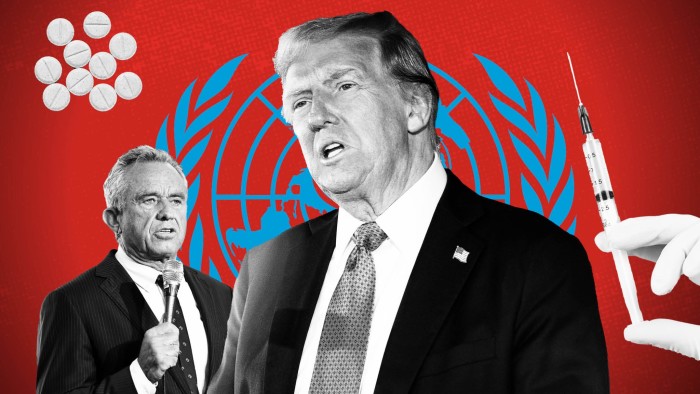Donald Trump’s return to the US presidency threatens to shake up and, in
some cases, undermine Washington’s commitments to global efforts to improve public health, according to multiple organisations and officials.
The plans by Trump’s transition team to again trigger a withdrawal from the World Health Organization reflected a wider suspicion of international bodies, they said, casting doubt over US contributions to scientific research, infectious disease control and pandemic preparation.
John-Arne Røttingen, chief executive of Wellcome Trust, one of the largest foundations funding health research, said: “US health leaders bring tremendous technical expertise, leadership and influence and their potential loss from the world stage would have catastrophic implications, leaving the US and global health weaker as a result.”
Experts are also concerned that the second Trump administration will spurn scientific best practice, spreading disinformation globally. They cite Trump’s nomination of Robert F Kennedy Jr, a prominent anti-vaccine campaigner, as health and human services secretary.
Discouraging vaccination campaigns would threaten “millions of lives worldwide”, said Peter Maybarduk, access to medicines director at Public Citizen, a US-based consumer advocacy group. “Disinformation could roll back one of humanity’s chief accomplishments of the past 100 years.”
A person close to the Trump transition team said: “I don’t think President Trump much cares what self-titled global health experts say. The American people resoundingly voted against the elites and those shoving their know-better attitude down the throats of the American people.”
Health experts have already warned that Trump plans to start the process of leaving the WHO on the first day of his administration on January 20, completing unfinished business from his first term and potentially crippling
vital programmes.
People close to the stalled negotiations for a WHO-brokered pandemic preparedness treaty are also worried that the new administration will sign that treaty’s death warrant.
The US is the largest funder of WHO and the Global Fund to fight HIV, tuberculosis and malaria. It bankrolls homegrown programmes such as Pepfar, which tackles HIV in more than 50 countries.
A reduction of US funding would come at a bad time for non-profit organisations, which are already battling cuts from other rich-country donors as the memory of the Covid-19 pandemic fades.
Gavi, the vaccine alliance, is trying to raise at least $9bn for its next five-year funding cycle and the Global Fund is asking for pledges to its replenishment round by October. Dianne Stewart, the Global Fund’s head of donor relations, said funding for health was either “shrinking or stagnant”.
Some NGOs will also be hit by the expected re-enactment of the “global gag rule”, which stops US funding to organisations that provide or promote abortion services. In Trump’s first administration, it led Marie Stopes International and the International Planned Parenthood Foundation to decline funding.
US domestic agencies, such as the National Institutes of Health and the Centers for Disease Control and Prevention, fund scientific research globally.
Dr Bernard Ogutu, chief research officer at Kenya Medical Research Institute, which receives support from the NIH, CDC and US army, said the threat of reduced funding was a “double tragedy” as many countries including Kenya, were suffering a “meltdown” of their economies.
Kennedy’s nomination has caused particular concern in Australia, which provided experts and equipment to help counter a 2019 measles outbreak that killed dozens of children in the Pacific island nation of Samoa.
Having met anti-vaccine activists in Samoa earlier that year, Kennedy was accused of amplifying distrust as authorities tried to rebuild confidence in the vaccination programme. Two children had died the previous year after the measles, mumps and rubella (MMR) jab was mistakenly mixed with a muscle relaxant. Kennedy denied any responsibility for the subsequent measles outbreak.
The risk of more deadly episodes like the Samoa measles outbreak would rise if the Trump administration attacked the credibility of childhood jabs such as the MMR vaccine, experts warn.
It was “hugely concerning” that vaccine sceptics such as Kennedy in the Trump administration appeared “unable to interpret or acknowledge the robust scientific evidence”, said Margie Danchin, a paediatrics professor and vaccinologist at Melbourne university.
For now, global health organisations are hoping to avoid Trump’s attention. Some are privately rallying sympathetic Republicans in Congress, compiling reports arguing that overseas funding also helps protect Americans.
Bjørn Lomborg, president of the Copenhagen Consensus Centre think-tank, has urged Trump’s health team to focus on “smarter spending” to improve the effectiveness of US aid.
Improved care for newborns and mothers was one area where targeted spending could make a big difference, he said. About 2.3mn children a year die in their first month and 300,000 mothers die in childbirth each year, according to UN figures.
“That’s exactly the strength of Trump. He’s not afraid to piss off a lot of people and say ‘we’re going to do the smarter stuff first’,” he added.
If the US does cut health funding, it is not obvious who will fill the gap. Lawrence Gostin, professor of global health at Georgetown Law, said European leaders had told him that neither the EU nor individual countries were likely to step up.
The prospect of China dominating global bodies could worry Trump, but Beijing also remained “ambivalent” about agencies such as the WHO, argued Jeremy Youde, a political scientist at Portland State University.
Gostin said “China has a very different idea of global health and multilateralism than the US”.
The Gates Foundation, a major force in global health and the WHO’s second largest funder, has not yet promised to increase its donations.
For Ayoade Alakija, a global health specialist and chair of Switzerland-based diagnostics NGO Find, the potential US retreat is a “clarion call” for leaders of developing nations to invest in their own countries.
Healthcare was “under threat from a multilateral perspective”, she said. “We saw it during Covid and you could almost say that at least Trump is honest [in thinking]: ‘I don’t really care about you all’.”
Additional reporting by Oliver Barnes in New York
Read the full article here

